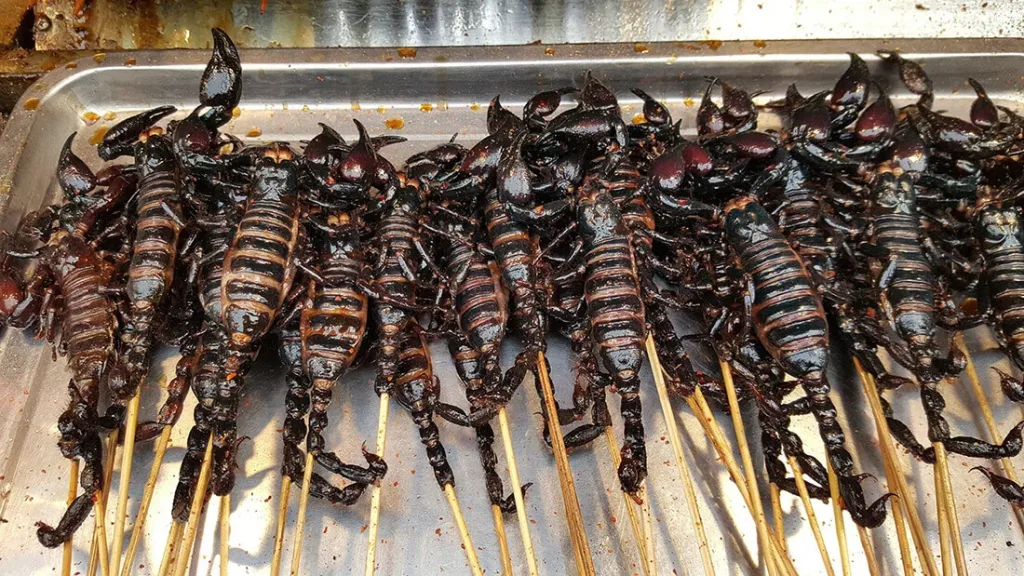Can you eat scorpions? The answer is yes, you can! Eating scorpions is not a new phenomenon; in fact, it has been practiced for centuries in many parts of the world. In recent years, however, eating scorpions has become increasingly popular as people look for new and unusual sources of protein. But what are the benefits and risks associated with eating scorpions?
First and foremost, it’s important to note that scorpions must be prepared properly before they can be ingested. After a scorpion dies its poison becomes inert, so it’s safe to eat frozen, dried, fried or baked scorpions. However, living or freshly killed scorpions should be avoided as their venom is still active. To prepare them correctly: heat a skillet over medium high heat and add butter, olive oil or both to the pan. Once the butter foams slightly (or olive oil gets a sheen), add minced garlic. When the garlic is fragrant, use tongs or chopsticks to pick up the arthropod and add it to the fat and garlic; cook for two to three minutes per side.
So why should you consider adding scorpions to your diet? Not only do they provide an interesting twist on ordinary meals but they’re also surprisingly nutritious! Scorpion meat consists of over 50% protein making them an excellent source of this essential nutrient. Additionally, they are low in fat and contain essential amino acids that are beneficial for muscle growth and recovery. And because they are sourced from local farms rather than beig imported from other countries like many other meats – they have a much lower carbon footprint than traditional types of meat production.
Finally, some people believe that eating insects like scorpions could be one of the solutions to world hunger since edible bugs are plentiful and far easier on resources than traditional livestock farming. This could be especially beneficial in areas where land for grazing animals is limited or non-existent altogether.
In conclusion, if you’re looking for a unique source of protein with numerous health benefits – give eating scorpions a try! Just make sure you prepare them properly so that all their nutritional goodness remains intact – then sit back and enjoy!

The Possibility of Becoming Poisonous by Eating Scorpions
No, you cannot become poisonous by eating scorpions. Scorpions are considered a delicacy in some parts of the world and can be eaten safely when cooked. The venomous toxins contained in a scorpion’s stinger and claws only become dangerous when the scorpion is alive or freshly killed. Once the scorpion has died, the venom loses its potency and becomes inert, so it is safe to eat frozen, dried, fried, or baked scorpions.
Cooking Scorpions
To cook scorpions, start by heating a skillet over medium high heat. Add butter, olive oil, or both to the pan. Once the butter foams slightly (or the olive oil gets a sheen), add minced garlic. When the garlic is fragrant, use tongs or chopsticks to pick up the arthropod and add it to the fat and garlic in the skillet. Cook for two to three minutes per side. Be sure to cook thoroughly before eating as undercooked scorpions can be toxic. Enjoy!
The Benefits of Eating Scorpion
People eat scorpion for a variety of reasons, but the most important one is for the nutritional benefits. Scorpions are rich in protein, providing over 50% of their total body weight. They are also high in iron and other micronutrients, making them a great source of nutrition for people who may be eating low-nutrient diets. Additionally, they contain essential fatty acids, which can help to reduce inflammation and improve overall health. Finally, some believe that eating scorpions may be an effective way to combat world hunger due to their abundance and availability.
Can Humans Survive Scorpion Stings?
Yes, it is possible for a human to survive a scorpion sting. While most scorpion stings are not life-threatening, they can still cause intense pain and discomfort. Symptoms may include localized pain, swelling, tingling or numbness around the area of the sting, as well as nausea and vomiting. In some cases, a person may develop an infection at the site of the sting. Fortunately, there have been very few reported deaths due to scorpion stings in the United States. However, in rare cases, a severe allergic reaction (anaphylaxis) may occur after a scorpion sting. If you experience any of these symptoms after getting stung by a scorpion, seek medical attention right away.
The Effects of Smoking Scorpion on Mental State
No, smoking scorpions does not make you high in the way that other recreational drugs can. Instead, it produces a feeling of intense euphoria, often described as a ‘high’ or an ‘acid trip’. This sensation usually lasts for up to ten hours and can be accompanied by mild hallucinations and a feeling of intense relaxation. However, for the first six hours of smoking scorpions, the user may experience physical discomfort as their body adjusts to the substance. Ultimately, due to its lack of scientific research and long-term effects on users, smoking scorpions is not recommended as a recreational drug.
Does the Taste of Scorpions Resemble Popcorn?
No, scorpions do not taste like popcorn. However, some people have compared the taste of cooked scorpion to popcorn, shrimp, or crab. It is important to note that scorpions should be cooked before eating and the stinger and venom gland should be removed for safety.

The Effects of Cinnamon on Scorpions
Cinnamon has long been used as a natural repellent to scorpions. The smell of ground cinnamon is an irritant to the scorpion, which causes them to stay away. Sprinkling ground cinnamon around areas where tere are scorpions can help deter them from entering. Additionally, essential oils such as lavender or cedarwood can act as a deterrent when placed around a property. It is important to note that while cinnamon and essential oils may help keep scorpions away, they will not eliminate an existing infestation. If you are dealing with an infestation of scorpions, it is best to contact a pest control professional for assistance.
The Predator of the Scorpion: Who Eats Them?
Predators of scorpions include large centipedes, tarantulas, lizards, birds (especially owls), and mammals such as bats, shrews, and grasshopper mice. Although these creatures may not consume scorpions as their primary source of food, they will hunt them for sustenance when necessary. Centipedes are their most common predator; they use their long legs to grab the scorpion and inject venom into the body before eating it. Tarantulas can also capture and eat scorpions with ease. Lizards, espcially geckos, are also known to feed on them. Birds such as owls will hunt and eat scorpions when other prey is scarce. Bats, shrews, and grasshopper mice have also been observed consuming scorpions as part of their diet.
The Uses of Scorpion Venom in Humans
Scorpion venom has been used by humans for a variety of medicinal purposes. It has been used as a pain reliever, to treat illnesses such as lupus and rheumatoid arthritis, and now researchers have discovered that the venom from a scorpion found in Eastern Mexico could have antibacterial properties. In addition to this, scorpion venom has also been investigated for its potential use in cancer treatments. This is due to cetain compounds within the venom having anti-tumor properties. One such compound is charybdotoxin, which can inhibit growth of prostate cancer cells. Scorpion venom has also been studied for its potential use in treating Alzheimer’s disease and epilepsy. Further research is needed to fully understand the potential medicinal applications of scorpion venom, but it is becoming increasingly clear that this substance could be an invaluable tool in fighting various diseases and health conditions.
The Benefits of Having Scorpions
Yes, scorpions actually have several benefits in nature. Scorpions are predators, which means they feed on a variety of potential pest organisms. This helps keep populations of these pests under control, ensuring that the environment is healthier and better balanced. Furthermore, some scorpions also feed on other scorpions, meaning they can act as a natural form of population regulation for their own species. Additionally, their venom can be used for medicinal purposes such as treating cetain types of cancer and pain relief. Finally, Scorpions are also an important food source for many other animals in the wild such as amphibians, birds and reptiles. All in all, scorpions play an important role in our environment both by providing food for other species and helping to keep pest populations under control.
Conclusion
In conclusion, while it is safe to eat frozen, dried, fried or baked scorpions, it is important to be cautious when handling freshly killed ones. Eating scorpions can provide the body with essential nutrients, with the most significant one being protein. While there are still debates about whether eating insects can help reduce world hunger, it is clear that Scorpions can be a great source of nutrition.
